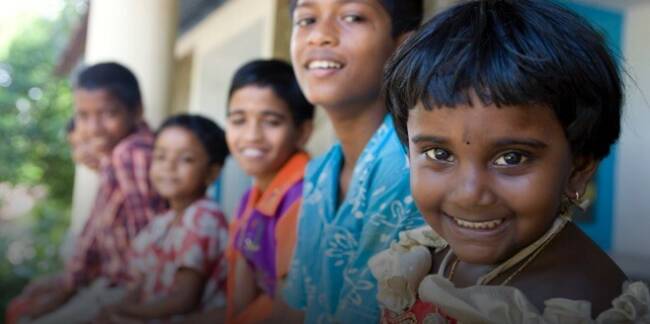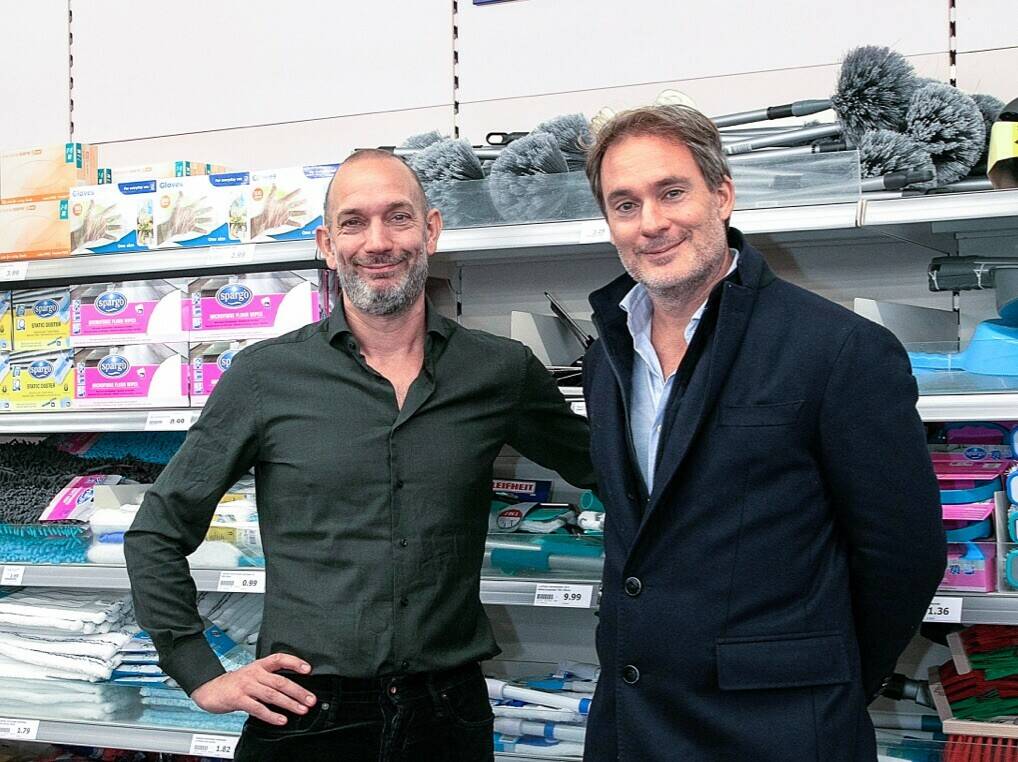highlights
about action
action in 2022
sustainability
people
planet
product
partnership
future
governance
appendix
Product

Every day, we give 100% to offer products which go beyond compliance with safety and quality standards.
We aim to source our products responsibly, taking societal and environmental interests into consideration in our supply chain processes. All while striving to continue to provide available and affordable products. We seek to improve product circularity, and aim to mitigate the negative impact caused by pollution from packaging by increasing the use of renewable materials and using less packaging material.
Joining forces for positive impact

Action and ImpactBuying have partnered to bring transparency to Action’s many supply chains, from cleaning products to food, and from ‘Do It Yourself products’ to multimedia. Data from more than 125 Action suppliers and over 1,500 factories have been mapped on the ImpactBuying Platform. Key social compliance insights are presented in clear dashboards. A partnership for impact at scale that has just begun.

Read more
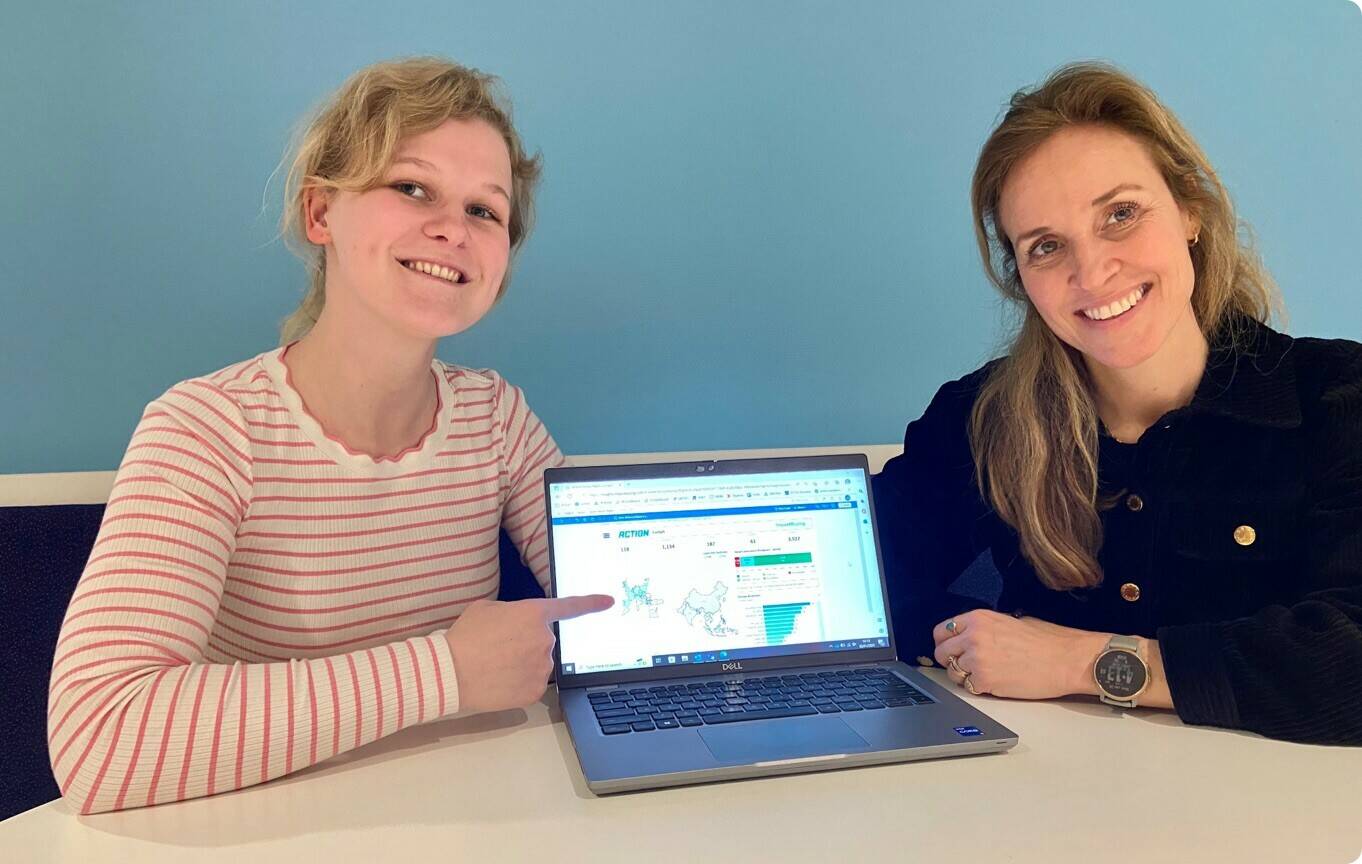
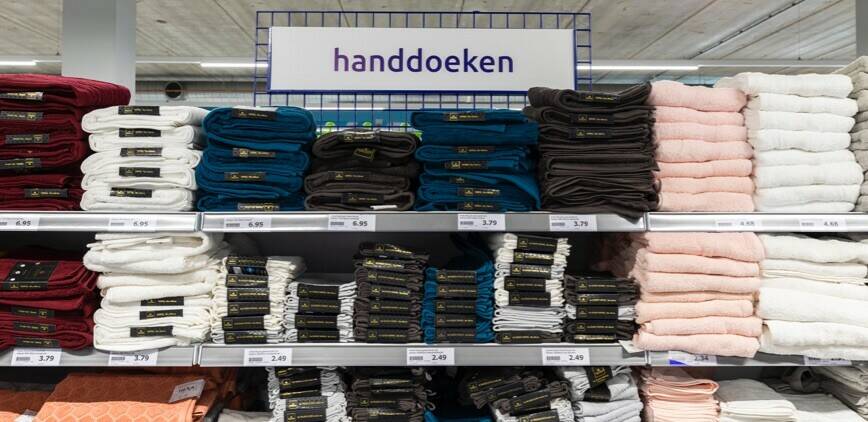
The material topics for Product are Responsible sourcing, Available and affordable products (new), Product circularity, Sustainable packaging, and Product quality and safety. Every new sustainability initiative or policy that we make, is done in consultation with internal and external stakeholders. That way, we ensure that the initiatives are supported and efficiently implemented by the business and that our policies have a strong foundation within our strategy.
Product pillar strategy and ambition
Policy commitments
In 2022, Action updated its Ethical Sourcing Policy. All our suppliers, both of commercial and non-commercial goods and services, are required to accept and commit to this new policy. Suppliers agree to adhere to the Ethical Sourcing Policy by signing our sourcing agreement. The policy lays the foundation for the responsible sourcing of products for direct and indirect imports. This document creates a shared understanding of values and desired business conduct with our suppliers. The key elements of our Ethical Sourcing Policy are drawn from the International Labour Organisation conventions, the OECD, the UN Guiding Principles on Business and Human Rights, and the amfori Business Social Compliance Initiative (BSCI) Code of Conduct. In addition, we have responsible sourcing policies for timber products, cotton, cocoa, chemicals, plastics and packaging. All policy commitments, including the Ethical Sourcing Policy, have been approved by the Executive Board of Action.
In 2022 we achieved, among other things, 100% private label supply chain transparency, 100% recyclable packaging for private label products and completed all fourteen circular category baseline assessments.
We want to source our products responsibly, improve product circularity, use less packaging material and increase the use of renewable packaging materials.
Highlights

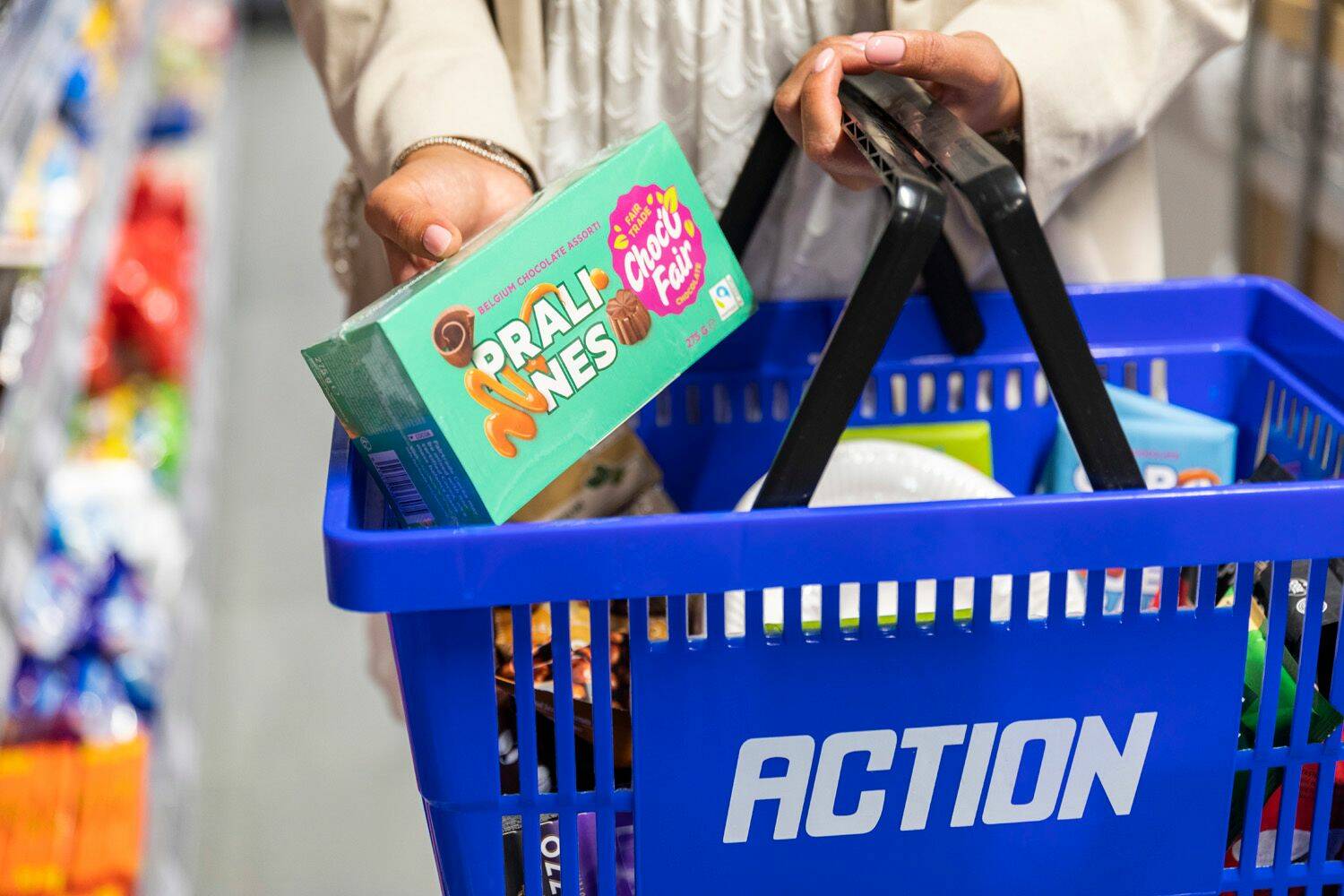
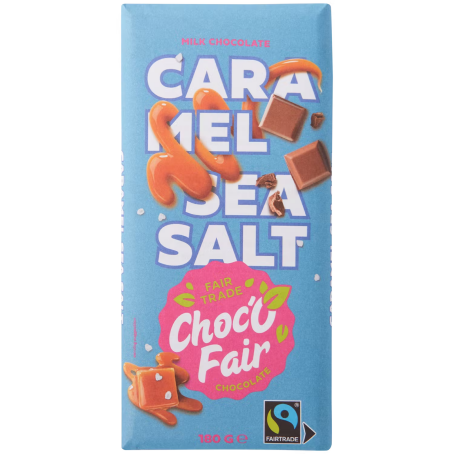
delivered of all our private labels sourced through wholesalers.
technical transparency
100%
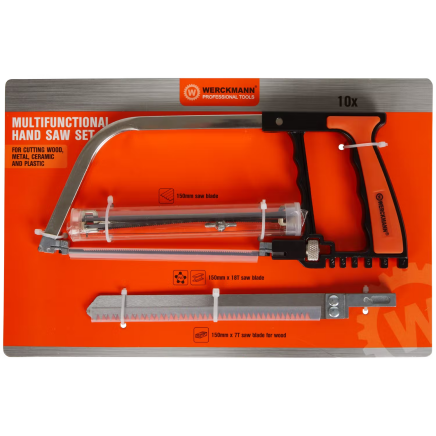
Recyclable by 2022 (no PVC or black plastics).
private label packaging
100%
products sourced as Fairtrade.
own brand cocoa
100%

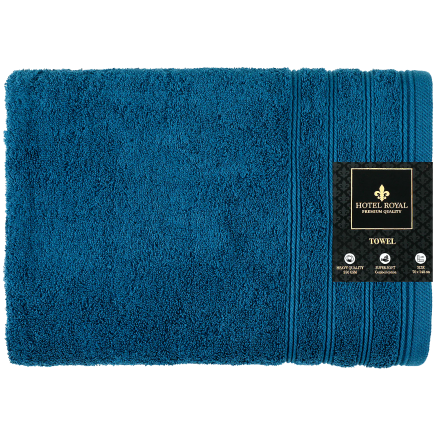
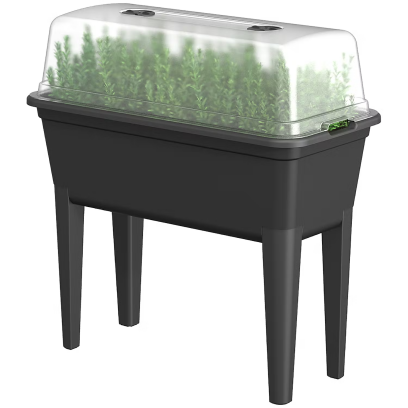
sustainable sourced with FSC/PEFC certification.
of timber products
92%
sustainable sourced following standards like BCI/organic/recycled.
of cotton products
90%
completed and have already improved 10 categories based on the assessment.
circular baseline
assessments
All 14
on technical and safety and social compliance for all our private label suppliers.
transparency
100%
In high risk countries were assessed on social impacts through social audits and spot checks.
factories
98%
updated and implemented.
Sourcing Policy
Ethical
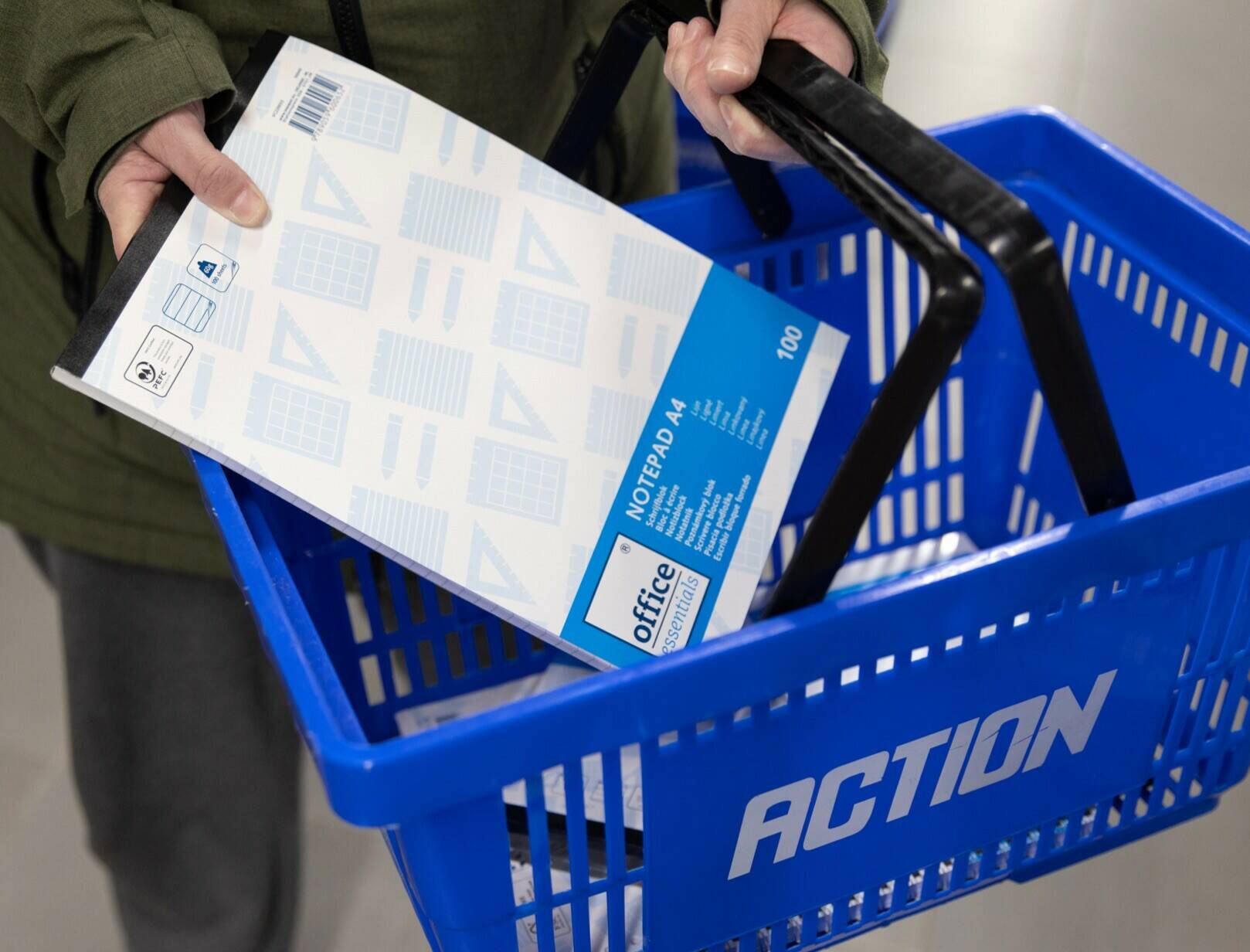

Responsible sourcing
Action has a global and elaborate supply chain, as it sources products for fourteen different product categories. We value environmental, human, and labour rights because we have a high potential to make positive impact and mitigate negative impact wherever we do business. Moreover, we aim to be compliant with current and future national and international laws and regulations. To live up to these values it is important to responsibly source all our products.
There were no big changes in Action’s supply chain in 2022. However, Action is slowly broadening its scope from China as its main sourcing country to other locations in and outside Europe. Action’s supply chain consists of suppliers (intermediary parties such as wholesalers and importers) and factories (where the final production takes place). Action sources from all over the globe, from Asia to Turkey, and from South America to Europe.
Action’s supplier network in 2022 consisted of 644 suppliers and 2,104 factories, where we source through direct import or domestic sourcing. With direct import, we source from suppliers or factories outside of the EU. Action then qualifies as an importer. With domestic sourcing, we source from EU-based suppliers with production in or outside of the EU or directly from producers within the EU. Action then qualifies as a distributor. The number of domestic sourcing factories is expected to increase next year while we are working on our supply chain transparency commitment. Almost 40% of our products are sourced from Europe (39.2%) and the rest from China (53.2%), other Asian countries (6.9%) and other regions (0.7%).
Action’s supply chain
We have procedures in place to identify and remediate social and environmental issues and apply constant due diligence. The procedures are a result of collaboration between multiple internal stakeholders such as Compliance, Buying, Sustainability and external stakeholders such as third-party experts and strategic partners. All our sourcing contracts include responsible sourcing clauses and we expect all our suppliers to adhere to our policies and commitments. Consequently, we conduct assessments, audits and spot checks. If a supplier does not meet our standards, we always strive for remediation first. Consistently not meeting our standards may result in termination of the relationship.
Management of material topic
We have the potential to make a positive social and environmental impact through our global supply chain. The key to responsible sourcing is having insight into where and how the products Action sources are produced. That is why we aim to gain full supply chain transparency and ask suppliers to commit to our sourcing policies. In 2022, we have mapped 1,576 factories to increase supply chain transparency. We achieve transparency by mapping products to factories and measure our impact by keeping track of the percentage of factories assessed on social and environmental impact. In this way, we make sure that our factories live up to our standards.
Strategic objective
Action categorises it products in 14 product categories: Garden & Outdoor, Household, Linen, Toys, Personal Care, Laundry & Cleaning, Food & Drinks, Sports, Clothing, Stationery & Hobby, DIY, Decoration, Multimedia and Pets. However, we also make a distinction between white label and private label products. Our private labels are products that are manufactured and sold exclusively at Action. Our white label products are manufactured and packaged by a supplier and sold by Action and other companies under various brand names. In addition, we sell well-known A-brands that customers can find at other retailers as well.
Action’s product management
N’zi N’guessan Moya Adeline Flavie
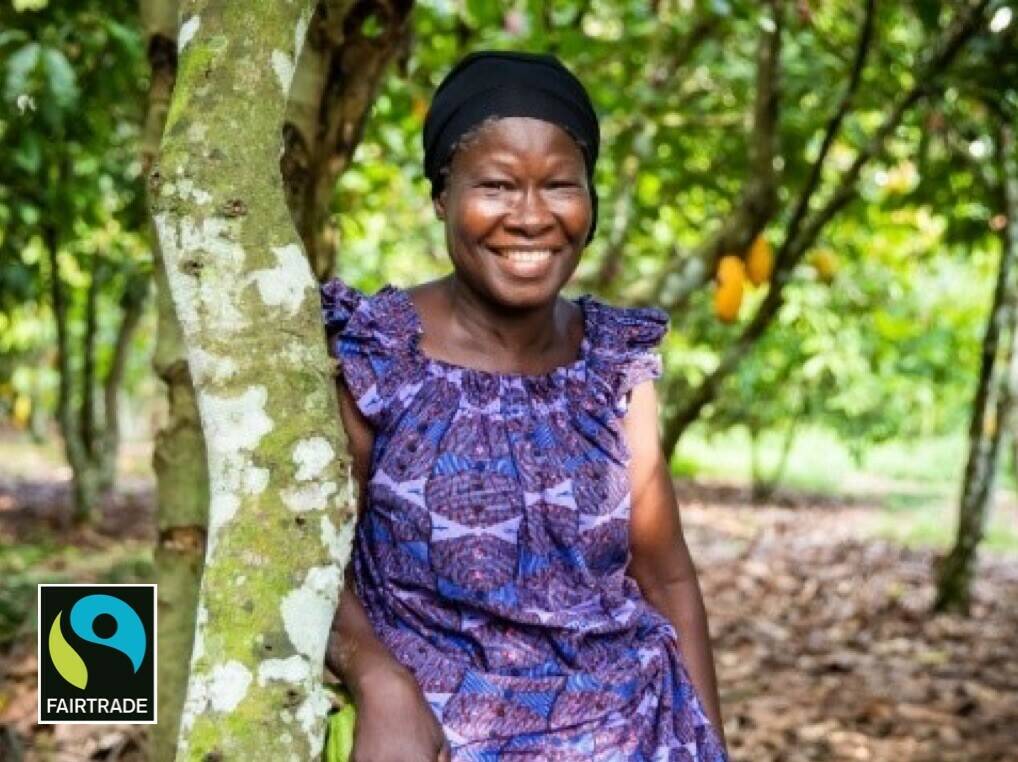



Read more
N’zi is a cocoa farmer and owns her land which she inherited from her father. She has been running her farm for ten years and produces cocoa, bananas, cassava and yams. Cocoa is the only product she can sell for money. The rest she uses for consumption. The land is divided into smaller plots that are tended by other family members, mainly nephews. N’zi supervises and makes sure the land is cultivated well.
Fairtrade premium for farmers

Sustainable certification marks

Progress made
In 2022, we conducted our first pilot for the environmental monitoring of factories. 28 suppliers completed the amfori BEPI self-assessment and two suppliers completed an on-site BEPI audit. The results have given us an initial understanding of potential and actual environmental impacts in our supply chain. We are a proud partner of amfori’s BEPI pilot, to address environmental challenges in Action’s direct operations. In 2023, this will provide us with essential feedback about our suppliers before a roll-out of the BEPI platform to a number of our direct factories in 2023.
In addition, the German Supply Chain Due Diligence Act will go into effect in 2023. To be compliant with this legislation we engaged consultancy firm Enact to evaluate our current due diligence practices. We performed our first risk analysis to identify our most salient human rights and environmental risks, in line with the UN Guiding Principles on Business and Human Rights and German Due Diligence requirements. The risk assessment covers the production of our products and raw materials in 29 risk countries (as defined by the amfori Country Risk Classification in 2022). We also performed a gap analysis to see what internal processes and policies we need to improve.
Action’s private and white label suppliers sourcing from one or more risk countries (as defined by amfori BSCI in their yearly Country Risk Classification) are required to be an active member of amfori. We believe it is our shared responsibility to ensure good ethical and environmental practices throughout our supply chain and the communities in which we operate. One of our key priorities is to ensure that our products are produced in a responsible manner with respect to human rights. In an effort to further our ambitions we are increasingly engaging with our suppliers. In 2022, 94% of our domestic suppliers had an active membership.
The responsible sourcing policies are implemented through third-party certification with strategic partners such as FSC, Better Cotton and Fairtrade. We are proud on the fact that 100% of our own brand (private label) cocoa products are sourced via Fairtrade, including a €384,000 Fairtrade premium that goes directly towards the cooperatives. With this premium, farmers and their communities can, amongst other things, plant shade trees to protect cocoa plants, buy fertiliser, be trained on good agricultural practices or build schools. This enables us to make a positive impact.
Social
In 2022, 98% of factories were assessed on social impacts through social audits and spot checks. There were five cases identified with significant actual and potential negative social impacts; two bribery attempts, one case of unauthorised subcontracting, one unethical business behaviour case and one child labour case. The child labour case was remediated by our partner Centre for Child Rights with the cooperation of the factory. Education was offered to the child and training was provided to the recruitment officers at the factory. There were no findings to suggest forced, compulsory or bonded labour in our supply chain.
All in all, 80% of the significant actual and potential negative social impacts identified were remediated in 2022. One case that occurred in late December is still pending remediation. No relationships were terminated as a result of these cases.
In order to prevent cases like the one described above, and because in 2023 the German Supply Chain Due Diligence Act will go into effect, Action engaged the consultancy firm Enact to evaluate its current due diligence practices. We performed our first risk analysis to identify our most salient risks and a gap analysis to see what internal processes and policies we need to improve.
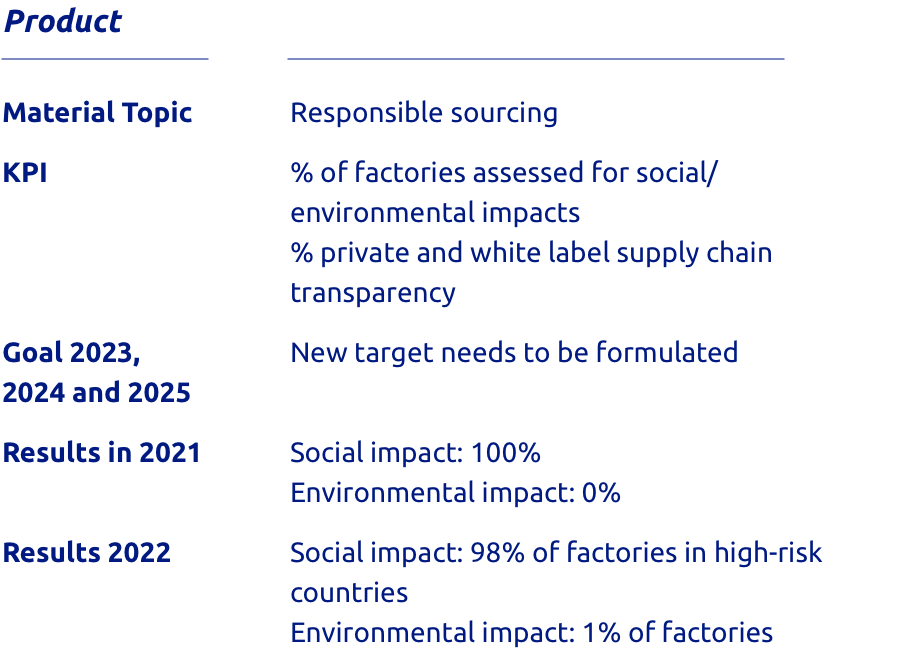


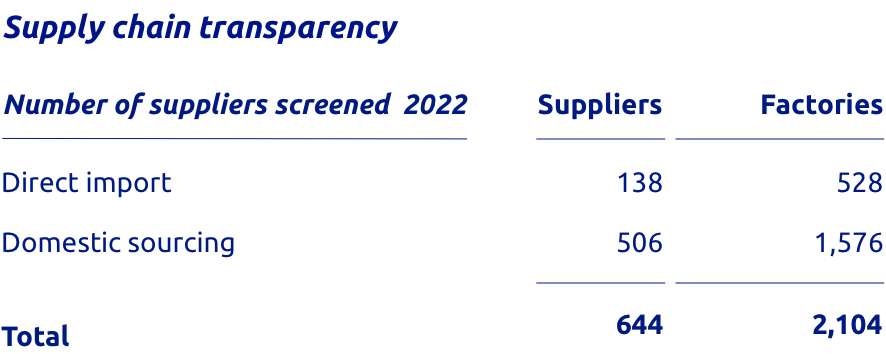
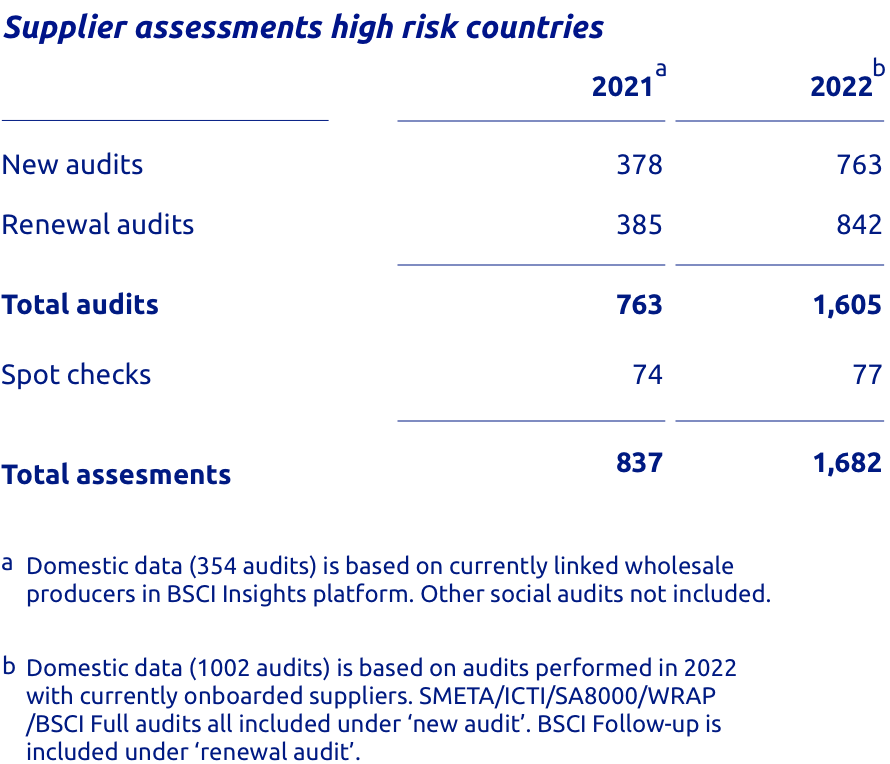
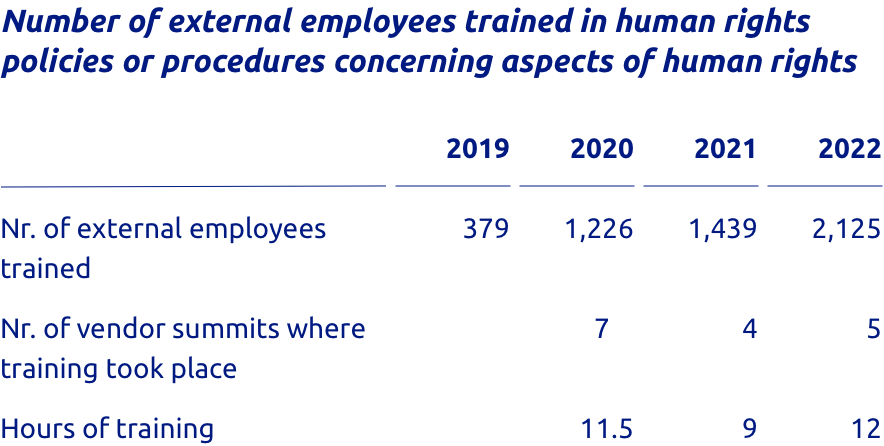
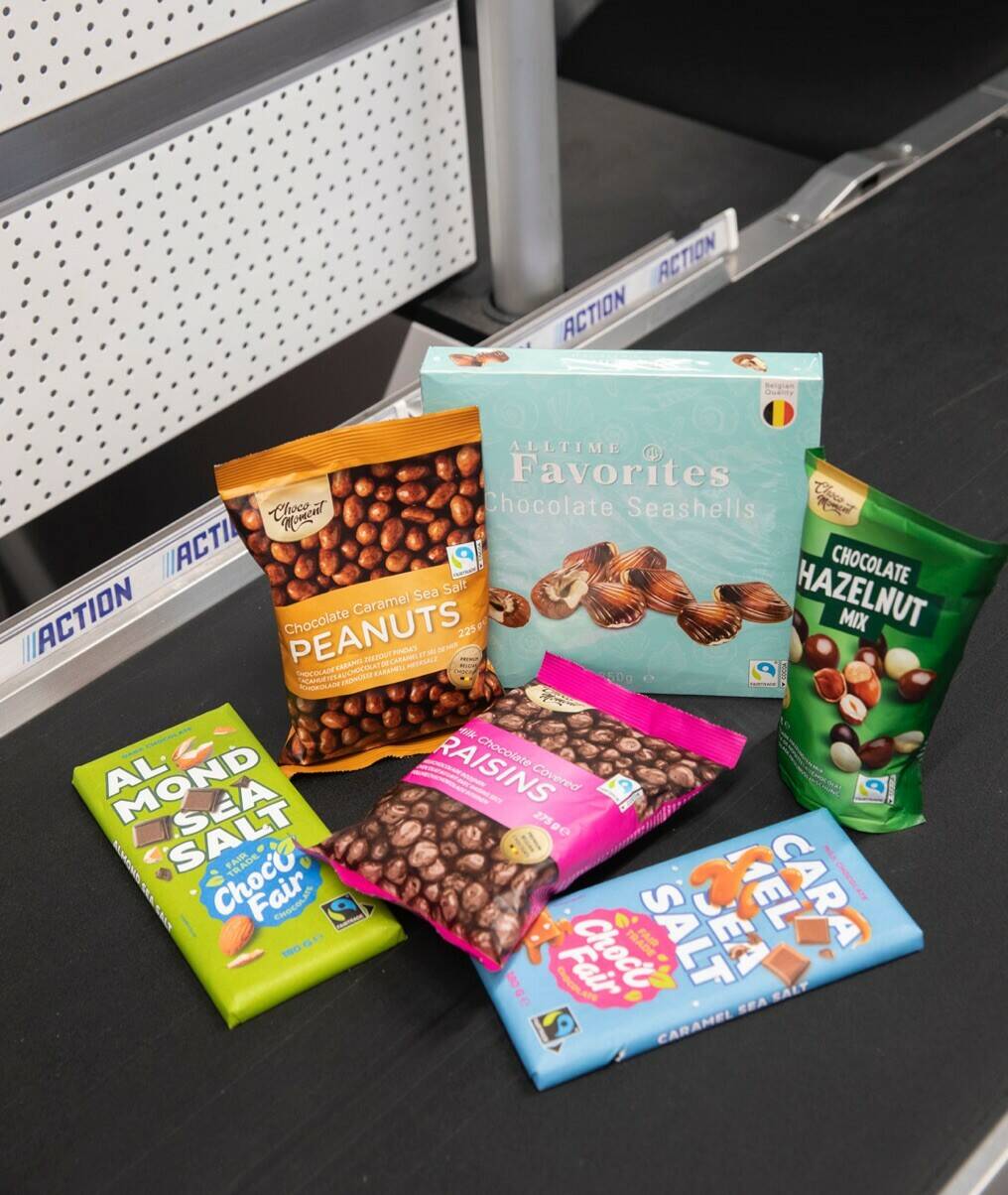
Monitoring and evaluation
We are continuously mapping the production locations of new private and white label articles. After all, supply chain transparency is the basis on which we monitor social compliance in our chain. We conduct factory audit and follow ups, ensuring that the production of our private and white label assortment respects our policies. The social audits are performed yearly by third-party auditing firms such as Intertek or TÜV Rheinland. Our preferred alignment is towards the BSCI Code of Conduct. However, to avoid auditing fatigue, we do accept another four internationally recognised social and ethical standards: SA8000, SMETA, WRAP and ICTI.
Apart from the social audits, we monitor potential human rights violations through our spot check programme. As part of this programme, we monitor 15% of our direct import suppliers. We select them based on risk and each spot check is unannounced. Every year, independent third parties execute the social audits and spot checks in the factories that work for Action. During this monitoring, factories are rated on 13 criteria using a rating, A being the best and E being the worst. Action has set a minimum business requirement of a C rating for all factories. The cases we encountered in 2022 range from D-rated factories to critical issues such as attempted bribery. When we identify a non-compliance with our standards, we follow our policies and procedures to mitigate the negative impact, with a priority on remediation and in severe cases termination of the contract. In every case, we evaluate the situation extensively and decide on the best course of action.
Our goal is to reach 100% white label transparency in 2025. Once we know the production location of a white label article, we continuously monitor social compliance by following up on social audits. In 2023, we want to have 100% sustainably sourced cocoa and cotton products, followed by sustainable timber in 2024. In early 2023 we will publish our Child Labour policy.
Remaining targets
The role of stakeholders
Action acknowledges the difficulty of achieving full supply chain transparency and that is why we work together with various specialised organisations such as ImpactBuying, and amfori BSCI who help in our supply chain transparency and social compliance efforts. ProductIP supports our suppliers in meeting product compliance.

Available and affordable products
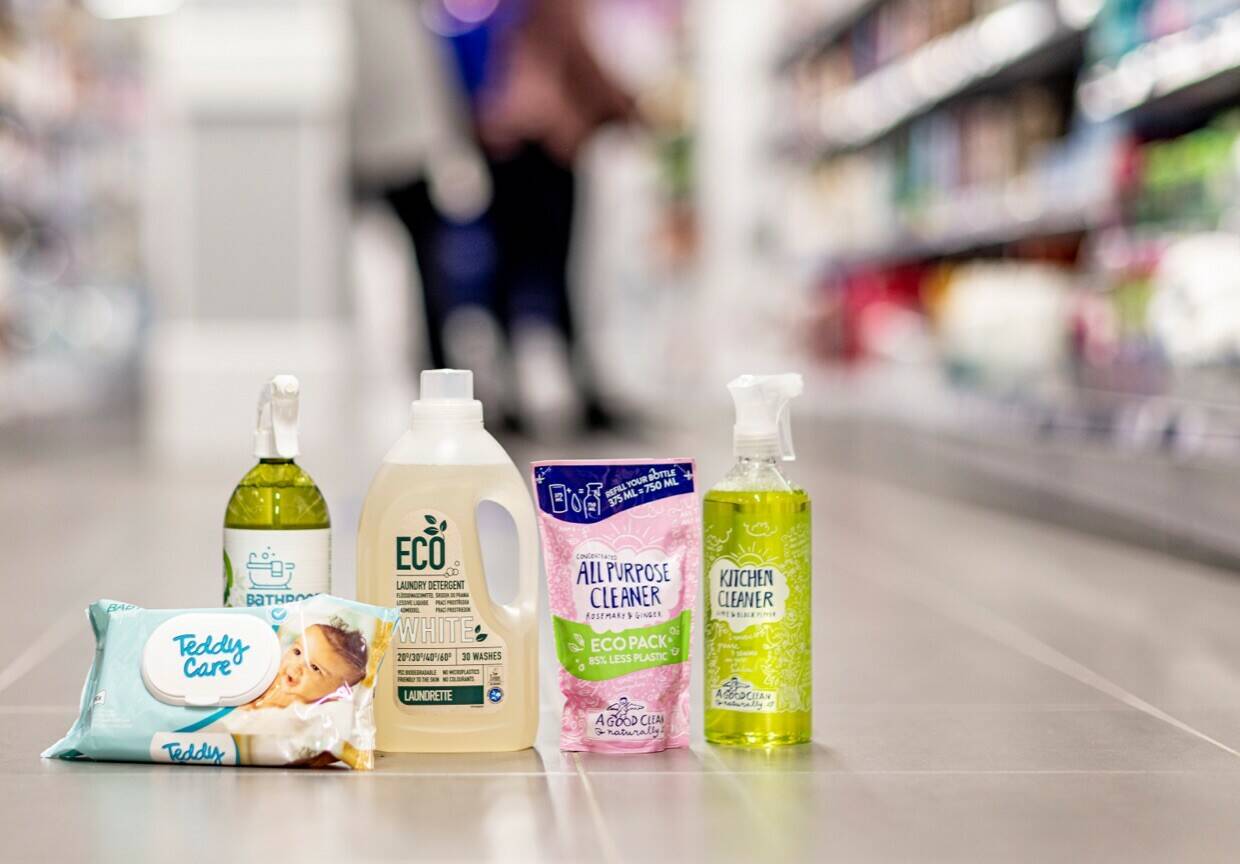

Continue reading
A new topic emerged from this year’s materiality assessment: Available and affordable products. The topic emphasises the positive impact Action has by providing affordable and high-quality products to all members of society, especially for those of lower incomes. Action helps people to buy essentials such as cleaning supplies, hygiene products and other products like clothing and toys for a low price.

Product circularity

Continue reading
We have embraced the circularity philosophy because we recognise that we cannot continue to rely on finite, non-renewable resources. In this year’s materiality assessment, Product circularity was confirmed as an important material topic. Our progress is measured through the circularity percentage per product category.

Sustainable packaging
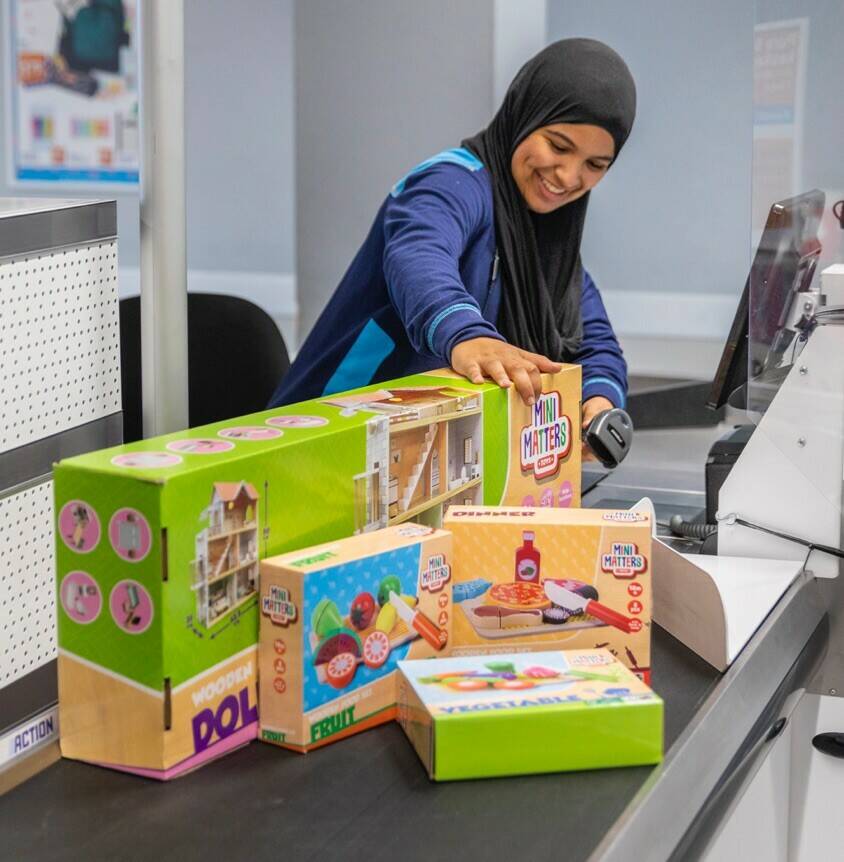

Continue reading
As the fastest growing non-food discounter in Europe, we bring a large number of packaging materials on to the market. We embrace our responsibility to reduce the waste impact of packaging by making choices with regard to alternative packaging, using different materials, less packaging material or using another design.
In 2022, we achieved our target of 100% recyclable packaging in our private label assortment. By 2025, all our packaging excluding A-brands, will have to be recyclable. Additionally, we have set a weight reduction target of 25% for the primary packaging of our fixed assortment (private and white label) by 2025 compared to our baseline of 2019.

Product quality and safety

Continue reading
Product quality and safety are also key to our sustainability strategy. Action ensures that all of its products are safe to use and that they comply with all relevant safety regulations and norms. In the case of products that are unsafe or lack quality, Action has a proper management of recalls and withdrawals.
Previous page

Partnership
Next page
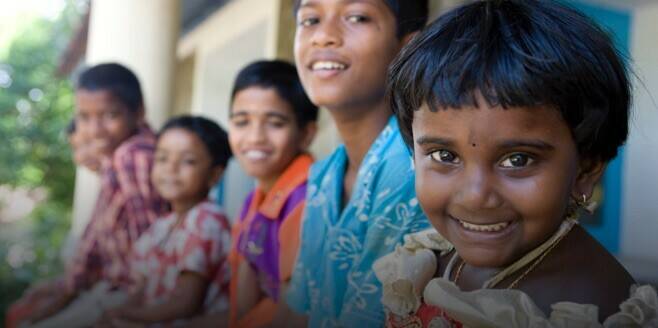

Planet
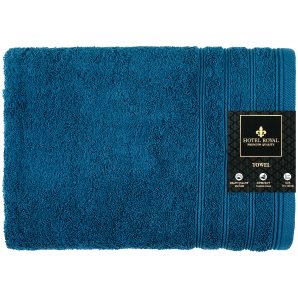
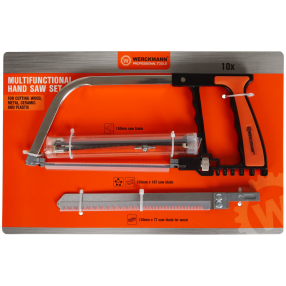
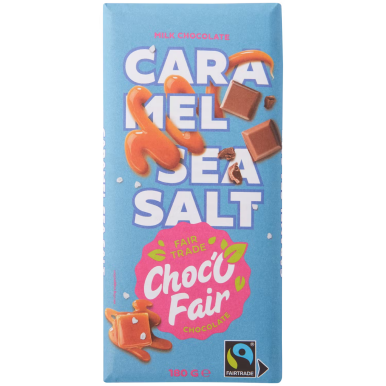

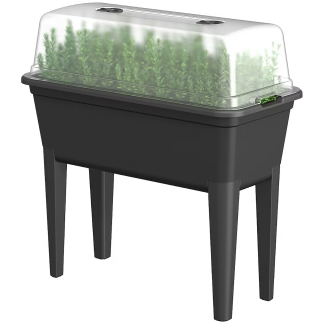
Product

Every day, we give 100% to offer products which go beyond compliance with safety and quality standards.
We aim to source our products responsibly, taking societal and environmental interests into consideration in our supply chain processes. All while striving to continue to provide available and affordable products. We seek to improve product circularity, and aim to mitigate the negative impact caused by pollution from packaging by increasing the use of renewable materials and using less packaging material.
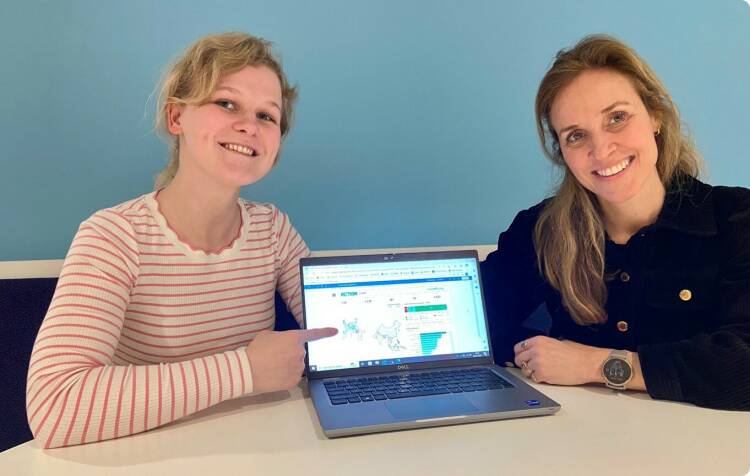
Joining forces for positive impact
Action and ImpactBuying have partnered to bring transparency to Action’s many supply chains, from cleaning products to food, and from ‘Do It Yourself products’ to multimedia. Data from more than 125 Action suppliers and over 1,500 factories have been mapped on the ImpactBuying Platform. Key social compliance insights are presented in clear dashboards. A partnership for impact at scale that has just begun.

Read more
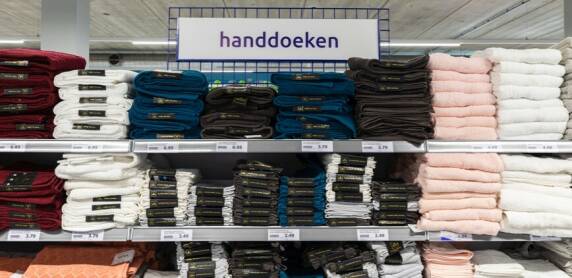
The material topics for Product are Responsible sourcing, Available and affordable products (new), Product circularity, Sustainable packaging, and Product quality and safety. Every new sustainability initiative or policy that we make, is done in consultation with internal and external stakeholders. That way, we ensure that the initiatives are supported and efficiently implemented by the business and that our policies have a strong foundation within our strategy.
Product pillar strategy and ambition
Policy commitments
In 2022, Action updated its Ethical Sourcing Policy. All our suppliers, both of commercial and non-commercial goods and services, are required to accept and commit to this new policy. Suppliers agree to adhere to the Ethical Sourcing Policy by signing our sourcing agreement. The policy lays the foundation for the responsible sourcing of products for direct and indirect imports. This document creates a shared understanding of values and desired business conduct with our suppliers. The key elements of our Ethical Sourcing Policy are drawn from the International Labour Organisation conventions, the OECD, the UN Guiding Principles on Business and Human Rights, and the amfori Business Social Compliance Initiative (BSCI) Code of Conduct. In addition, we have responsible sourcing policies for timber products, cotton, cocoa, chemicals, plastics and packaging. All policy commitments, including the Ethical Sourcing Policy, have been approved by the Executive Board of Action.
In 2022 we achieved, among other things, 100% private label supply chain transparency, 100% recyclable packaging for private label products and completed all fourteen circular category baseline assessments.
We want to source our products responsibly, improve product circularity, use less packaging material and increase the use of renewable packaging materials.
Highlights

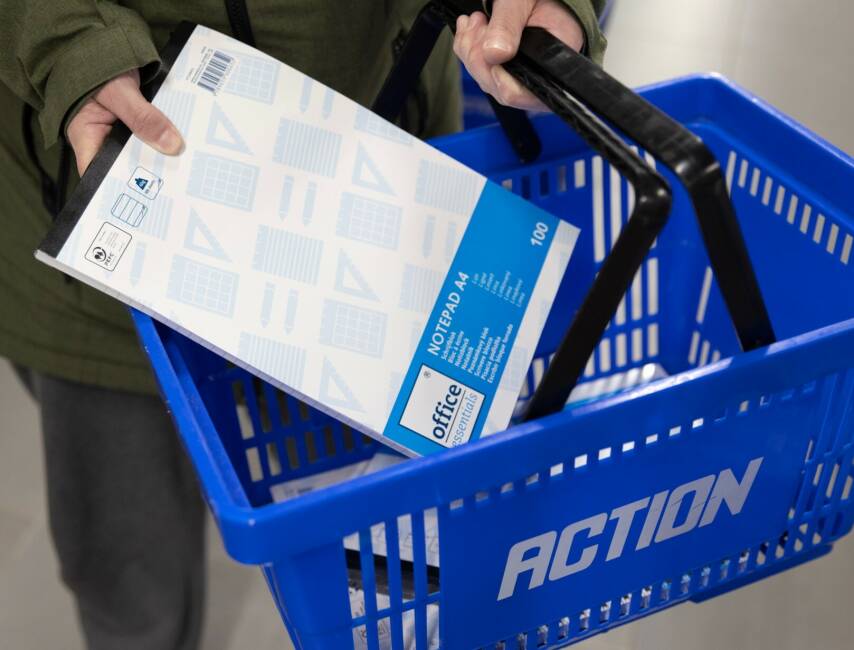
on technical and safety and social compliance for all our private label suppliers.
transparency
100%
completed and have already improved 10 categories based on the assessment.
circular baseline
assessments
All 14
sustainable sourced following standards like BCI/organic/recycled.
of cotton products
90%
sustainable sourced with FSC/PEFC certification.
of timber products
92%
updated and implemented.
Sourcing Policy
Ethical
In high risk countries were assessed on social impacts through social audits and spot checks.
factories
98%
products sourced as Fairtrade.
own brand cocoa
100%
delivered of all our private labels sourced through wholesalers.
technical transparency
100%
Recyclable by 2022 (no PVC or black plastics).
private label packaging
100%
Responsible sourcing
Action has a global and elaborate supply chain, as it sources products for fourteen different product categories. We value environmental, human, and labour rights because we have a high potential to make positive impact and mitigate negative impact wherever we do business. Moreover, we aim to be compliant with current and future national and international laws and regulations. To live up to these values it is important to responsibly source all our products.
There were no big changes in Action’s supply chain in 2022. However, Action is slowly broadening its scope from China as its main sourcing country to other locations in and outside Europe. Action’s supply chain consists of suppliers (intermediary parties such as wholesalers and importers) and factories (where the final production takes place). Action sources from all over the globe, from Asia to Turkey, and from South America to Europe.
Action’s supplier network in 2022 consisted of 644 suppliers and 2,104 factories, where we source through direct import or domestic sourcing. With direct import, we source from suppliers or factories outside of the EU. Action then qualifies as an importer. With domestic sourcing, we source from EU-based suppliers with production in or outside of the EU or directly from producers within the EU. Action then qualifies as a distributor. The number of domestic sourcing factories is expected to increase next year while we are working on our supply chain transparency commitment. Almost 40% of our products are sourced from Europe (39.2%) and the rest from China (53.2%), other Asian countries (6.9%) and other regions (0.7%).
Action’s supply chain
We have procedures in place to identify and remediate social and environmental issues and apply constant due diligence. The procedures are a result of collaboration between multiple internal stakeholders such as Compliance, Buying, Sustainability and external stakeholders such as third-party experts and strategic partners. All our sourcing contracts include responsible sourcing clauses and we expect all our suppliers to adhere to our policies and commitments. Consequently, we conduct assessments, audits and spot checks. If a supplier does not meet our standards, we always strive for remediation first. Consistently not meeting our standards may result in termination of the relationship.
Management of material topic
We have the potential to make a positive social and environmental impact through our global supply chain. The key to responsible sourcing is having insight into where and how the products Action sources are produced. That is why we aim to gain full supply chain transparency and ask suppliers to commit to our sourcing policies. In 2022, we have mapped 1,576 factories to increase supply chain transparency. We achieve transparency by mapping products to factories and measure our impact by keeping track of the percentage of factories assessed on social and environmental impact. In this way, we make sure that our factories live up to our standards.
Strategic objective
Action categorises it products in 14 product categories: Garden & Outdoor, Household, Linen, Toys, Personal Care, Laundry & Cleaning, Food & Drinks, Sports, Clothing, Stationery & Hobby, DIY, Decoration, Multimedia and Pets. However, we also make a distinction between white label and private label products. Our private labels are products that are manufactured and sold exclusively at Action. Our white label products are manufactured and packaged by a supplier and sold by Action and other companies under various brand names. In addition, we sell well-known A-brands that customers can find at other retailers as well.
Action’s product management
N’zi N’guessan Moya Adeline Flavie
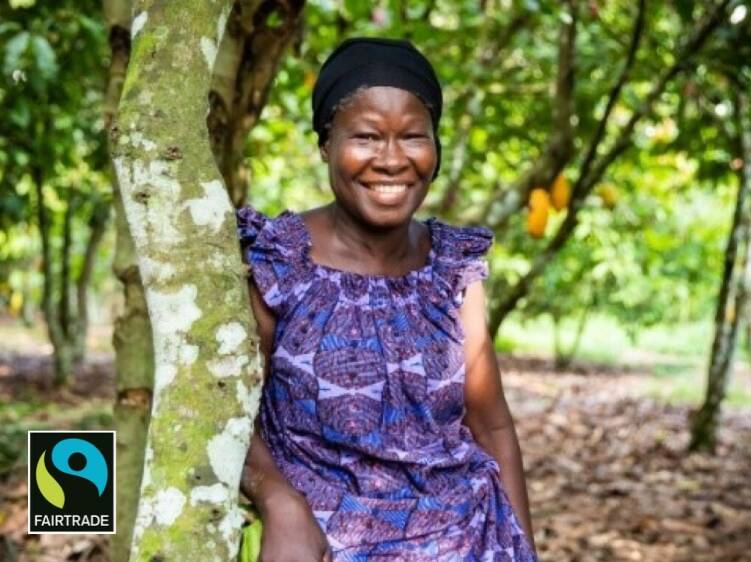

Read more
N’zi is a cocoa farmer and owns her land which she inherited from her father. She has been running her farm for ten years and produces cocoa, bananas, cassava and yams. Cocoa is the only product she can sell for money. The rest she uses for consumption. The land is divided into smaller plots that are tended by other family members, mainly nephews. N’zi supervises and makes sure the land is cultivated well.
Fairtrade premium for farmers
" We continue to see a growth in consumer purchase of Fairtrade products. In 2021, cocoa was our largest growth category at 15% from the prior year leading to significant impact for cocoa farmers. This is in large part due to commitments from companies like Action. We are proud to work with Action on their continued journey towards better incomes and dignified livelihoods for cocoa farmers. We count Action as one of our important long-term partners on the road to social justice for all.”
Peter d’Angremond
Director Fairtrade Netherlands.

Fairtrade Netherlands
Rogier van der Vat and Fabio Magnani Managing Director Dayes Europe B.V.
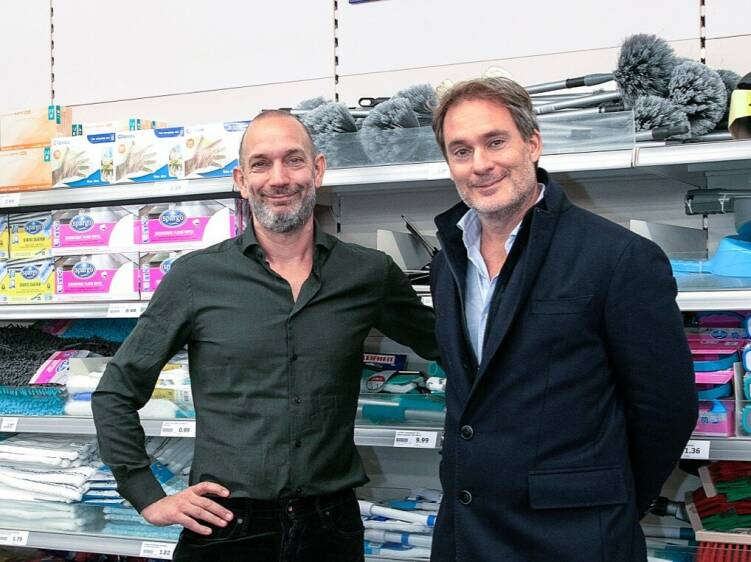

Read more
Our supplier Dayes delivers more than 500 different products on a daily basis to Action stores across Europe. To keep playing at our level, they must constantly innovate. Sustainable products play a significant role in this. Managing director Rogier van der Vat and Fabio Magnani from our supplier Dayes explain.
Always innovating as a supplier
“Action prepares its suppliers to join amfori and as such, allows both them and Action to work more diligently on both social and environmental supply chain due diligence.”
Norma Wouters-Snell
Network Representative
- The Netherlands from Amfori BSCI.

Amfori BSCI
Progress made
In 2022, we conducted our first pilot for the environmental monitoring of factories. 28 suppliers completed the amfori BEPI self-assessment and two suppliers completed an on-site BEPI audit. The results have given us an initial understanding of potential and actual environmental impacts in our supply chain. We are a proud partner of amfori’s BEPI pilot, to address environmental challenges in Action’s direct operations. In 2023, this will provide us with essential feedback about our suppliers before a roll-out of the BEPI platform to a number of our direct factories in 2023.
In addition, the German Supply Chain Due Diligence Act will go into effect in 2023. To be compliant with this legislation we engaged consultancy firm Enact to evaluate our current due diligence practices. We performed our first risk analysis to identify our most salient human rights and environmental risks, in line with the UN Guiding Principles on Business and Human Rights and German Due Diligence requirements. The risk assessment covers the production of our products and raw materials in 29 risk countries (as defined by the amfori Country Risk Classification in 2022). We also performed a gap analysis to see what internal processes and policies we need to improve.
Action’s private and white label suppliers sourcing from one or more risk countries (as defined by amfori BSCI in their yearly Country Risk Classification) are required to be an active member of amfori. We believe it is our shared responsibility to ensure good ethical and environmental practices throughout our supply chain and the communities in which we operate. One of our key priorities is to ensure that our products are produced in a responsible manner with respect to human rights. In an effort to further our ambitions we are increasingly engaging with our suppliers. In 2022, 94% of our domestic suppliers had an active membership.
The responsible sourcing policies are implemented through third-party certification with strategic partners such as FSC, Better Cotton and Fairtrade. We are proud on the fact that 100% of our own brand (private label) cocoa products are sourced via Fairtrade, including a €384,000 Fairtrade premium that goes directly towards the cooperatives. With this premium, farmers and their communities can, amongst other things, plant shade trees to protect cocoa plants, buy fertiliser, be trained on good agricultural practices or build schools. This enables us to make a positive impact.
Sustainable certification marks

Social
In 2022, 98% of factories were assessed on social impacts through social audits and spot checks. There were five cases identified with significant actual and potential negative social impacts; two bribery attempts, one case of unauthorised subcontracting, one unethical business behaviour case and one child labour case. The child labour case was remediated by our partner Centre for Child Rights with the cooperation of the factory. Education was offered to the child and training was provided to the recruitment officers at the factory. There were no findings to suggest forced, compulsory or bonded labour in our supply chain.
All in all, 80% of the significant actual and potential negative social impacts identified were remediated in 2022. One case that occurred in late December is still pending remediation. No relationships were terminated as a result of these cases.
In order to prevent cases like the one described above, and because in 2023 the German Supply Chain Due Diligence Act will go into effect, Action engaged the consultancy firm Enact to evaluate its current due diligence practices. We performed our first risk analysis to identify our most salient risks and a gap analysis to see what internal processes and policies we need to improve.
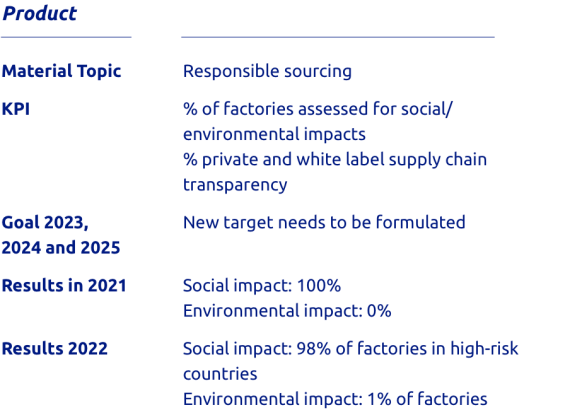


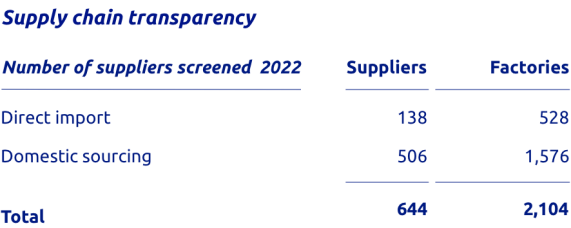
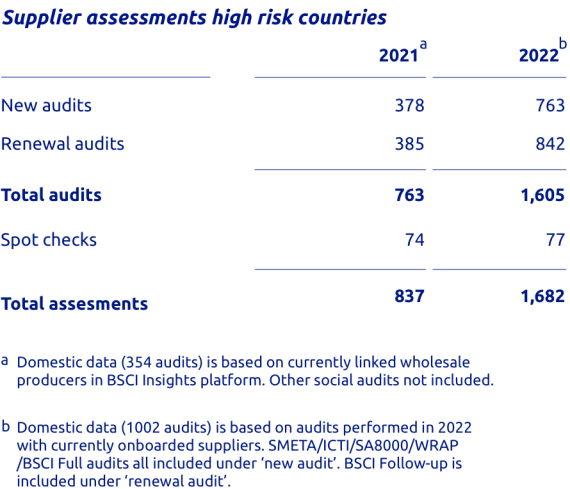
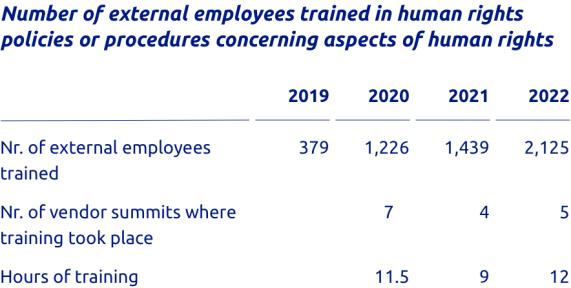
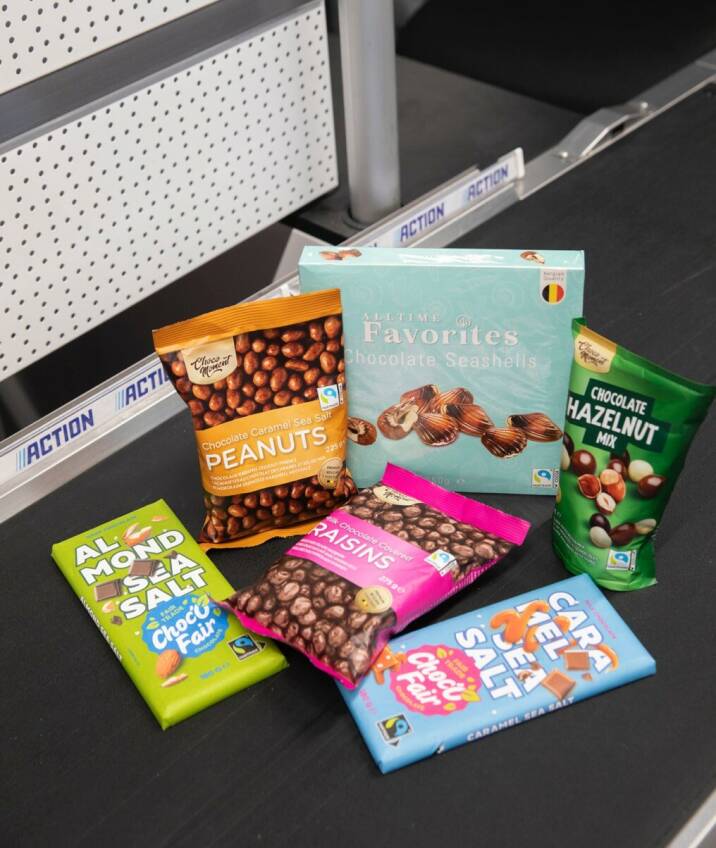
Monitoring and evaluation
We are continuously mapping the production locations of new private and white label articles. After all, supply chain transparency is the basis on which we monitor social compliance in our chain. We conduct factory audit and follow ups, ensuring that the production of our private and white label assortment respects our policies. The social audits are performed yearly by third-party auditing firms such as Intertek or TÜV Rheinland. Our preferred alignment is towards the BSCI Code of Conduct. However, to avoid auditing fatigue, we do accept another four internationally recognised social and ethical standards: SA8000, SMETA, WRAP and ICTI.
Apart from the social audits, we monitor potential human rights violations through our spot check programme. As part of this programme, we monitor 15% of our direct import suppliers. We select them based on risk and each spot check is unannounced. Every year, independent third parties execute the social audits and spot checks in the factories that work for Action. During this monitoring, factories are rated on 13 criteria using a rating, A being the best and E being the worst. Action has set a minimum business requirement of a C rating for all factories. The cases we encountered in 2022 range from D-rated factories to critical issues such as attempted bribery. When we identify a non-compliance with our standards, we follow our policies and procedures to mitigate the negative impact, with a priority on remediation and in severe cases termination of the contract. In every case, we evaluate the situation extensively and decide on the best course of action.
Our goal is to reach 100% white label transparency in 2025. Once we know the production location of a white label article, we continuously monitor social compliance by following up on social audits. In 2023, we want to have 100% sustainably sourced cocoa and cotton products, followed by sustainable timber in 2024. In early 2023 we will publish our Child Labour policy.
Remaining targets
The role of stakeholders
Action acknowledges the difficulty of achieving full supply chain transparency and that is why we work together with various specialised organisations such as ImpactBuying, and amfori BSCI who help in our supply chain transparency and social compliance efforts. ProductIP supports our suppliers in meeting product compliance.
Available and affordable products
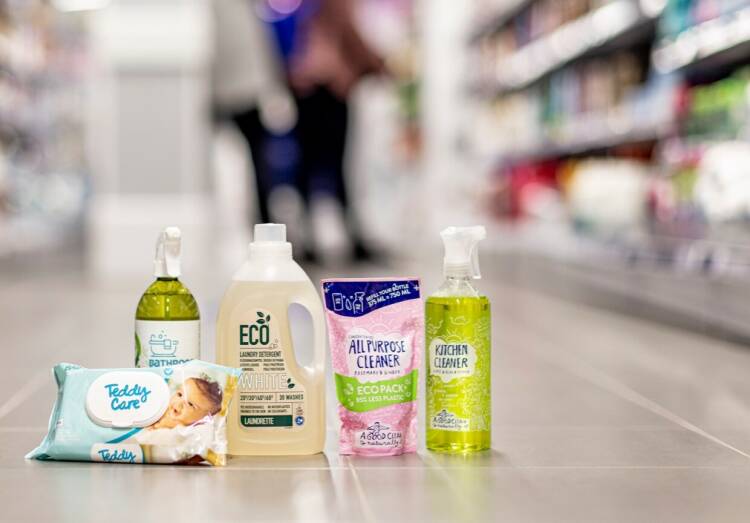

Continue reading
A new topic emerged from this year’s materiality assessment: Available and affordable products. The topic emphasises the positive impact Action has by providing affordable and high-quality products to all members of society, especially for those of lower incomes. Action helps people to buy essentials such as cleaning supplies, hygiene products and other products like clothing and toys for a low price.
Product circularity

Continue reading
We have embraced the circularity philosophy because we recognise that we cannot continue to rely on finite, non-renewable resources. In this year’s materiality assessment, Product circularity was confirmed as an important material topic. Our progress is measured through the circularity percentage per product category.
Sustainable packaging
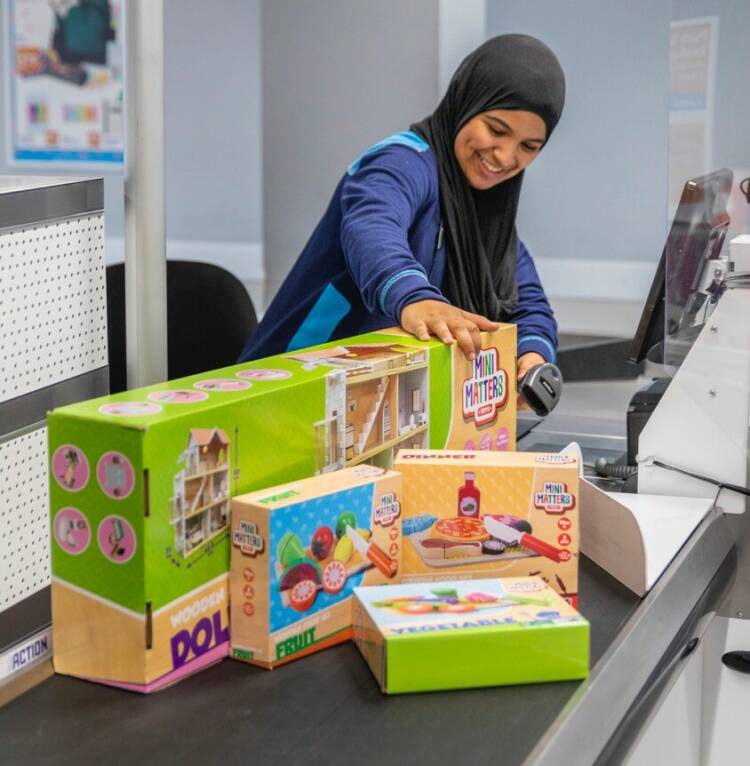

Continue reading
As the fastest growing non-food discounter in Europe, we bring a large number of packaging materials on to the market. We embrace our responsibility to reduce the waste impact of packaging by making choices with regard to alternative packaging, using different materials, less packaging material or using another design.
In 2022, we achieved our target of 100% recyclable packaging in our private label assortment. By 2025, all our packaging excluding A-brands, will have to be recyclable. Additionally, we have set a weight reduction target of 25% for the primary packaging of our fixed assortment (private and white label) by 2025 compared to our baseline of 2019.
Product quality and safety

Continue reading
Product quality and safety are also key to our sustainability strategy. Action ensures that all of its products are safe to use and that they comply with all relevant safety regulations and norms. In the case of products that are unsafe or lack quality, Action has a proper management of recalls and withdrawals.

Partnership
Next page
